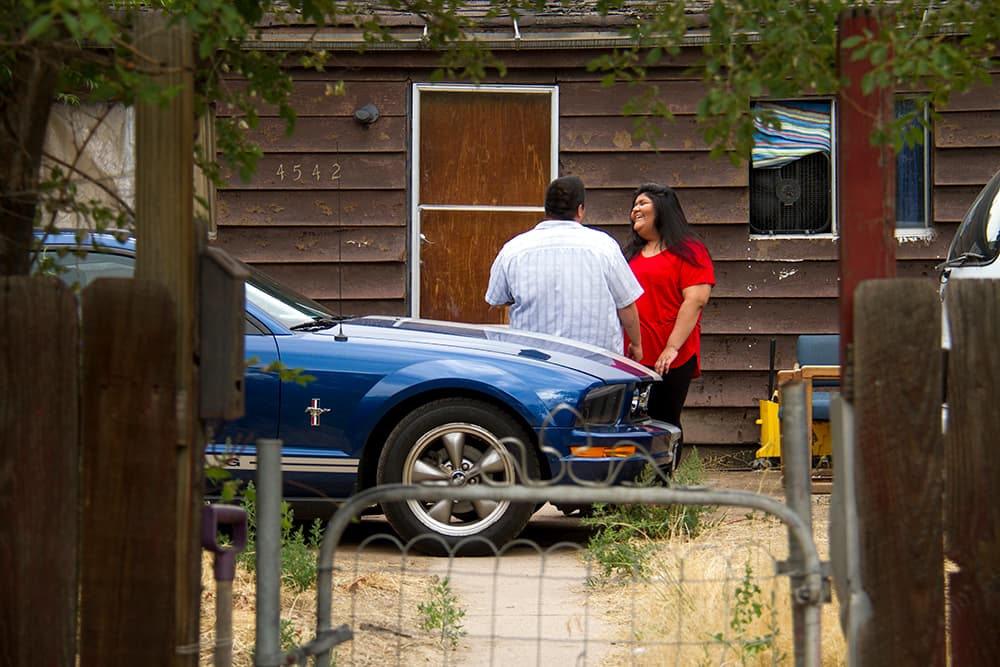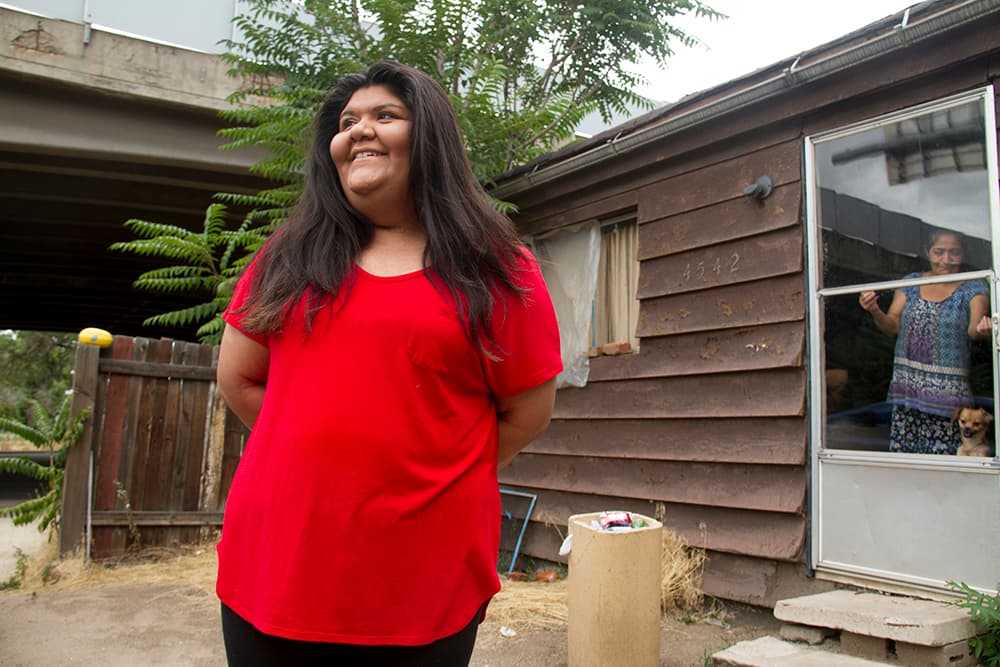
Nothing has happened the way it was supposed to happen for the family of Esmeralda Aguilar.
Their home in the 4500 block of Fillmore Street is on the south side of Interstate 70, and it wasn't supposed to be affected by the plan to widen the highway and sink it underground. They weren't supposed to find out from a neighbor instead of CDOT that they actually would lose their home to construction, or to be the ones to inform their landlord.
And once they started meeting with a relocation specialist, early assurances that they would emerge from this process as homeowners have turned into a messy and uncertain reality that has everyone on edge.
"You can just feel what is going on inside the house. It's a lot of stress. Where are we going to move? We need to find better jobs," Aguilar said.
Rebecca White, a spokeswoman for CDOT, said the agency can't comment on specific cases, but they try to make the relocation process as smooth as possible.
"I do want to stress that the acquisition process is the most difficult aspect of the I-70 Project -- as it is for any CDOT project," she wrote in an email. "We recognize the extremely personal nature of this and have done our utmost to make the process as easy and understandable and sensitive as possible."
Finding homes, though, is challenging, especially in this market.
"It's just crazy right now," White said in an interview.
Aguilar is just one person caught up in the disruption wrought by the planned widening of I-70.
The project, which is still awaiting final approval from the Federal Highway Administration and has been challenged in court by opponents, requires CDOT to take 56 homes and 18 businesses.
The issues that Aguilar's family faces in finding new housing are common among families in Elyria-Swansea. They're a large family that stays together to provide mutual support, like many multi-generational households in the neighborhood. Some family members are undocumented. Some have serious health problems. And they earn very little money.
Aguilar's father became disabled in 2010 after seizures affected his short-term memory and cognitive abilities. Aguilar's parents are both undocumented. She had to leave college without graduating to help her parents because her sister and two brothers were still in school when her dad got sick.
"I'm the one that brings in the money. It's been on me," she said. "I left school to help out. That's why I left school. It was me deciding I have to quit school and go back to Denver and help out financially, being dad so my mom could be mom."

She earns a little more $21,000 a year with several part-time jobs and has student loans on top of household expenses. She's 24, the oldest of four siblings, all of whom still live in the family home.
The rent on the two-bedroom home tucked practically underneath the I-70 viaduct is cheap by Denver standards, just $550 a month, which is how the family gets by.
Here's what CDOT will do for families displaced by the widening:
The department will pay the difference between the rent the family pays now and the rent the family pays in a new home for 42 months -- three and a half years. Families can also take that difference in one lump sum and use it for a downpayment on a home, but the family still has to qualify for the mortgage.
So far, CDOT has moved 31 families, and 14 renters have become homeowners. Helping renters become homeowners is one of the priorities of what's known as the Uniform Act, the federal law that governs the purchase of property and relocation of families for major infrastructure projects. Of the new homeowners, seven bought mobile homes outright with their settlements instead of taking on mortgage payments.
There are some other wrinkles. People who get assistance are supposed to be "residents in good standing of the United States," a provision that excludes undocumented immigrants. There are hardship provisions that let CDOT make exceptions, especially for families with mixed status, families where some members are legal immigrants or citizens and some are not.
"We haven't had a problem with that yet," White said.
The Uniform Act also doesn't allow CDOT to move families from housing that is considered substandard to new housing that is also substandard. Children older than 10 have to have their own bedroom and can't share with siblings or other relatives. Many families in Elyria-Swansea are doubled up, tripled up, quadrupled up.
Aguilar's family of six adults needs a five-bedroom home.
"This family will need a significantly larger home," White said. "Our responsibility is to find them a home that works for their family. We would not place a family squeezed into a small home."
White said CDOT is committed and also legally bound to helping families regardless of income. However much money the agency needs to provide, they'll provide it, but actually finding the homes in this market is difficult.
CDOT's relocation specialist looks for homes in the areas where the families facing displacement want to live. For Aguilar, that's Elyria-Swansea. She's lived there her whole life. It's also where the clinic her parents rely on is located. Everything is close by, and they can walk or take the bus. She worries that moving to the suburbs and starting over would be too hard for her parents, and they would be isolated without a car. Elyria-Swansea is home.
Aguilar said in her initial meetings with the relocation specialist, she was told she could become a homeowner, but over additional meetings, as the specialist realized how little Aguilar earned and how large a house the family would need, that promise was rolled back. Things are a bit of a mess now. Maybe if her brothers are also on the mortgage, they might qualify. Aguilar had hoped her brothers could consider college and put their energy into figuring out what they want to do in life. Instead, they're looking for whatever job they can get to boost the family's income.
But even then, it's not clear if it will be enough.
"I wasn't supposed to have to put money in it," Aguilar said. "Now she says I don't make enough, and I have to put my brothers in it. I told her from the beginning that my credit isn't the best -- I have student loans -- now it's a problem.
"Not that I mind doing work, but she has me going to different classes to get different loans. And we're not moving because we want to move. So why do I have to do these things when you're the one making us move?"
Meanwhile, Aguilar doesn't know how long the process will take or whether the relocation specialist is actively looking for a home for her family or if she's in line behind some of the other 56 families who will have to move to make way for the project. She was told she could look on her own but not to get too invested in anything she found. Some homes won't meet the requirements.
Don Callarman has already moved.
He said he's very happy on the other side of the process. It was "traumatic" to go through at the time, with a lot of waiting and very little information, but he now owns a two-bedroom home in Globeville, the first home he's ever owned.
Callarman, 77, is "mostly retired" but still works some as an artist. He doesn't want to say just how much he got from CDOT, but with a "substantial" downpayment, "I'm paying on the loan the same amount I was paying to rent the old place." That's a little less than $800 a month.
As a single adult, it was a little easier to find a home that would fit his three-cat household than it is for large extended families. He said he did have to do a lot of the legwork himself, but in the end, he's happy.
"The people who are waiting just have to be patient," he said. "I'm super satisfied. I would tell them, 'Just hang in there, it's going to be alright.'"
None of this is happening in a vacuum.
Elyria-Swansea is one of the Denver neighborhoods most at risk for gentrification and displacement. As both a longtime resident and a youth facilitator with Project VOYCE, Aguilar sees her friends struggling and dispersed. Swansea Elementary is losing enrollment as families move out. It's not just individual families that are affected, but the fabric of the community as its members end up in Aurora, in Commerce City and much farther flung places.
Aguilar said she wishes CDOT would be more understanding of how hard the process is, even with a promise of financial help, and that they would provide more frequent updates. She doesn't know what to tell her family about the best course of action because she doesn't know what's happening or when.
"They say, 'This is what we're doing for you,' and it makes you feel bad," Aguilar said. "And then reality hits you, that even if they are doing that, it doesn't stop you from worrying."
Assistant Editor Erica Meltzer can be reached via email at [email protected] or twitter.com/meltzere.
Subscribe to Denverite’s newsletter here.












